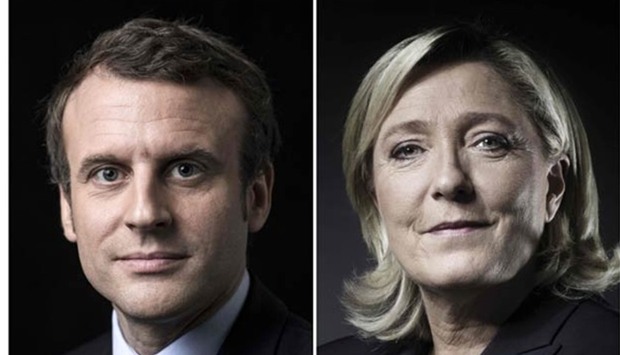Centrist Emmanuel Macron and far-right leader Marine Le Pen will contest the second round of the French presidential election, initial projections suggested on Sunday, after a nailbiting vote seen as vital for the future of the EU.
Macron was projected to win between 23 and 24% in Sunday's first round, slightly ahead of National Front leader Le Pen with between 21.6 and 23%, according to estimates on public television.The outcome capped an extraordinary few months for a deeply divided France, which saw a campaign full of twists and turns and a movement away from traditional parties.
The French vote was being closely watched as a bellwether for populist sentiment following the election of Donald Trump as US President and Britain's vote to leave the EU.
Le Pen and Macron were the pre-vote favourites to progress to the run-off on May 7 but late gains by conservative Francois Fillon and radical leftist Jean-Luc Melenchon had blown the race wide open.
The vote took place under heavy security after the killing on Thursday of a policeman on Paris's Champs Elysees avenue claimed by the Islamic State group.
With France still under the state of emergency imposed after the Paris attacks of November 2015, around 50,000 police and 7,000 soldiers were deployed to guard voters.
Thursday's shooting on the most famous street in Paris was the latest in a bloody series of terror attacks that have cost more than 230 lives since 2015.
Nearly 47mn people were eligible to vote in the eurozone's second biggest economy.
Voting was brisk on a bright spring day, defying forecasts of a low turnout after a campaign dominated by scandals and disillusionment with the mainstream parties of the left and right that have alternated in power for the past half century.
Riding the wave of disaffection with globalisation that carried Trump to the White House and led Britain to vote for Brexit, Le Pen vowed to abandon the euro, hold a referendum on withdrawing from the EU and adopt a French-first policy on jobs and housing.
Analysts had said a Le Pen victory could nonetheless be a devastating blow for the EU, already weakened by Britain's shock vote to leave.
Macron, a 39-year-old pro-EU reformer, is seeking to become France's youngest ever president despite never having held elected office.
Tapping into anger with established parties, the former banker and economy minister formed his own movement, "En Marche" (On the Move), that he says is "neither to the left nor to the right."
Le Pen cast her ballot in Henin-Beaumont, a former coal mining town in the party's northern heartland.
Macron voted in the chic northern seaside resort of Le Touquet with wife Brigitte, his former high school teacher who is 25 years his senior. Fillon and Melenchon both voted in Paris.
Many voters had spent weeks agonising over their choices, with many opting for the contender they considered likeliest to beat Le Pen in a run-off.
A total of 11 candidates took part in the election.

